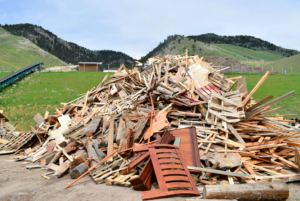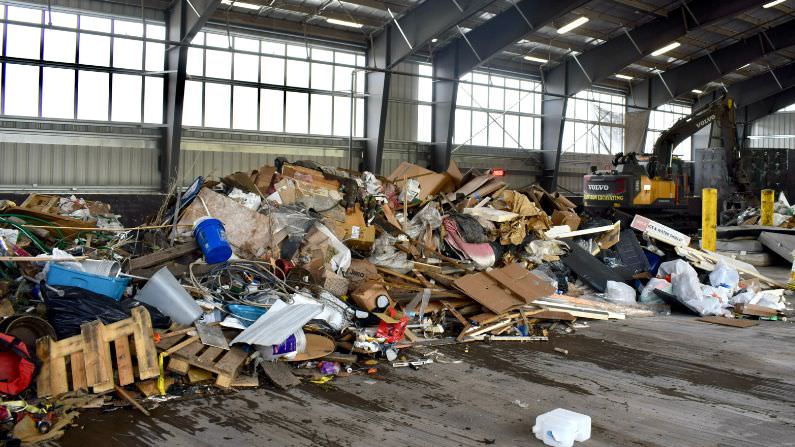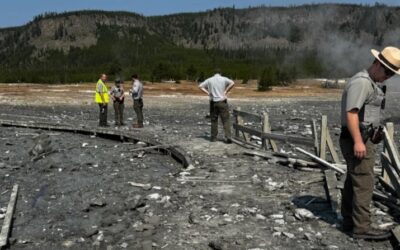To most people, a pile of construction waste looks like a hodgepodge of materials: Wood, insulation, plastic, tile and more. But to Brenda Ashworth, superintendent of solid waste and recycling for Teton County, a load like that just represents a missed opportunity.
KHOL chatted with Ashworth as she examined the remnants of a remodel on a recent Wednesday.
“If you look at some of the wood pieces, this wood could have been put into the compost pile, ground up and diverted from the landfill,” Ashworth said.
Instead, the wood will likely be pushed using machinery into a truck and then driven to Bonneville County, Idaho. Ashworth said that’s because sorting through piles of materials when contracting companies don’t do it themselves is time-consuming and expensive, so she has to send it down the road.
“We are getting so much volume that the staff here at the transfer station cannot handpick this out,” she said.

A pile of wood that can be composted and thus diverted from the Bonneville County Landfill. (Will Walkey/KHOL)
Over the past four years, construction and demolition waste moving through the Teton County, Wyoming, transfer station has risen by 175%, with a 32% jump in just the past fiscal year alone. Other types of trash haven’t seen increases on that scale, indicating how much impact the local real estate and building boom has had on Jackson Hole’s facilities.
The building where machinery sorts and loads construction and demolition waste, for instance, has suffered 10 years worth of damage in just a two-year time frame. That’s because most building materials are harsh, jagged and destructive.
“In the fall of 2021, we did a remodel on this building where we added quarter-inch plate [of] steel all along the push walls in the back to protect these walls. And that cost the county $300,000,” Ashworth said.
Teton County, Idaho, has seen similar increases at its transfer station, according to Dave Hudacsko of RAD Curbside, the Driggs company that’s contracted to haul waste throughout Teton Valley and Alta, Wyoming.
Part of Hudacsko’s mission is to try and follow through on his local government’s goals to divert more waste from its landfill, which is an 87-mile drive from the Teton County, Idaho, transfer station. But that’s been a challenging prospect in recent years. For instance, Hudacsko’s had to add more dumpsters in some areas to keep up with demand from construction sites.
“We have to manage the waste,” he said. “And if we don’t start sorting better with the construction demolition waste, the public is going to get hit with significant costs in taxes or solid waste fees to increase or improve or expand the infrastructure to manage these waste volumes.”
On both sides of the pass, haulers are trying to incentivize workers to sort their own loads. Ideally, laborers can learn what can be composted or recycled and what can’t and then drop off their materials at the appropriate places at the transfer station or with RAD Curbside.
In Teton Valley, the tipping fee for sorted waste from large construction projects is $15 per ton, while the unsorted fee is $210 per ton, a $195 per ton incentive. In Jackson Hole, the gap is even larger at $300 per ton.
“For many folks, it’s just an ethical value of, ‘We don’t need to be that wasteful with our construction and demolition waste. We can sort. We can save some money and it’s the right thing to do,’” Hudacsko said. “For others, it’s not as incentivizing. They want to move fast.”
If a load is particularly large and unsorted, both transfer stations will flat out reject it and tell the contractor to bring it back to their site. Unfortunately, Ashworth said she knows that the time and cost of doing so is often passed on to the local workforce.
“For the contractors who are working with these materials, they have very limited space on-site to sort this material. A lot of times they’re working on [an area the size of a] postage stamp just like we are. And so, having enough bins to sort a lot of material is problematic on their end as well. And we recognize that,” Ashworth said. “But it is hard to see good wood going to the landfill when we have a great composting facility right next door.”
New sorting and rejection policies have been in place for more than a year now, and Ashworth said many of the contractors she works with, especially locals, are starting to get on board with the county’s goals and regulations.
“We are happy to go through it with you. We will do a site visit. We’ll do multiple site visits. We’ll help you train your staff and we’ll explain the why,” Ashworth said. “Why are we doing this and why is it important?”
Back at the transfer station, a few local workers use brooms to drag kitchen sinks, carpeting, light fixtures and sheetrock out of their truck bed. Those are all materials destined for the landfill because they can’t be recycled or composted, while everything else they dropped off earlier in the week will be reused in another way.
Ashworth expects construction and demolition waste to continue to rise despite her best efforts to educate the public and divert more. That volume and wear and tear on Teton County’s facilities will only stop when new construction and remodeling in Jackson Hole starts to slow down. In the meantime, the superintendent and her team are trying to make a difference where they can.





